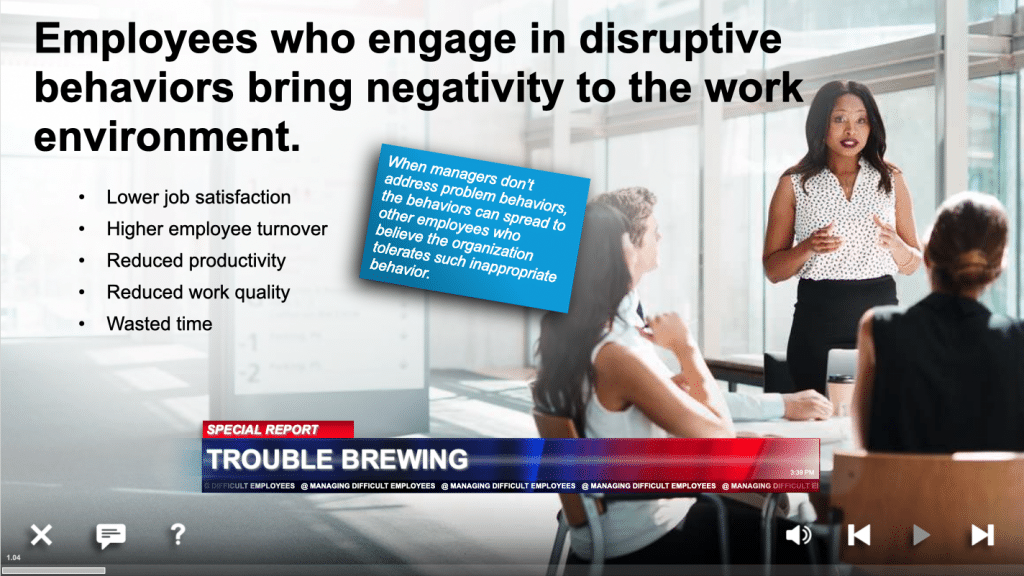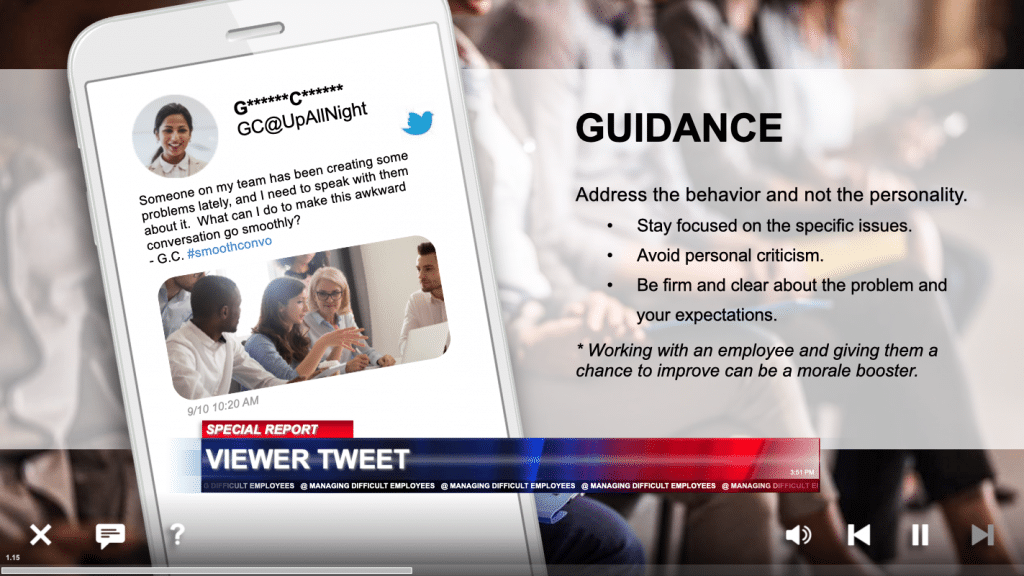
Managing Difficult Employees
Guiding your managers on how to handle inappropriate or disruptive behaviors gives them the tools to handle incidents whenever and wherever they happen, and inspires them to protect the well-being of their teams.
Course description
This 20-minute interactive course provides managers with insights and practical steps on how to handle difficult employees and disruptive behaviors. Realistic examples of different types of behaviors and situations, along with challenge questions and interactions, strengthen engagement and boost learning.
ONLINE TRAINING
Managing Difficult Employees

The course covers:
- How to identify and address problem behaviors
- How to conduct professional, constructive conversations with employees
- The importance of documentation and following policies and procedures
- Working with the employee on an action plan
- Administering fair and consistent discipline
- Minimizing the risk of complaints of discrimination, retaliation and/or wrongful termination
KEY FEATURES
Why you'll love our training
It’s time to embrace a new era of online training with a valued partner who will ensure seamless implementation, along with a learning experience your employees will truly enjoy.
Course administration
Traliant makes it simple to roll out training to your workplace and provide technical support directly to your employees at no additional cost.
Course customizations
Tailor courses to include your logo, relevant policies, workplace images, and more. Traliant can even customize the course with scenarios that take place in your own workplace environment.
Translations
Training is available in English, Spanish and is supported in over 100 languages.
What to consider when choosing the most effective difficult employee training

- Maintain a positive and productive work environment: Difficult employees can negatively impact morale, productivity, and teamwork. Training helps managers address these issues and create a more positive workplace.
- Reduce the risk of legal issues: Mishandling difficult employee situations can lead to legal problems, such as discrimination or wrongful termination claims. Training helps managers to navigate these issues effectively and to comply with employment laws.
- Protect the organization's reputation: Disruptive behavior can damage an organization's reputation. Training helps to ensure that managers handle these situations appropriately and to minimize reputational risks.
- Empower managers: Training provides managers with the confidence and skills they need to address challenging employee behavior effectively.
- Strengthen your organization's culture: Training promotes a culture of respect, where employees understand that inappropriate behavior will be addressed.
- Reduce the risk of escalation: Training helps managers to intervene early and to prevent disruptive behavior from escalating into more serious problems.
- Negativity and complaining: Constantly complaining, criticizing, or spreading negativity.
- Incivility and disrespect: Being rude, disrespectful, or aggressive towards colleagues or customers.
- Poor performance: Not meeting performance expectations or failing to complete tasks.
- Attendance issues: Frequently arriving late, leaving early, or taking excessive time off.
- Uncooperative behavior: Refusing to follow instructions, resisting change, or being generally uncooperative.
Here are some key steps for managers:
- Address the behavior promptly: Don’t let negative behavior continue or escalate. Timely intervention helps preserve team trust and performance.
- Document the behavior: Keep detailed records of what occurred, including dates, times, witnesses, and the impact on the team or work environment.
- Hold a private conversation with the employee: Clearly explain the behavior in question, its impact on others or the business, and what needs to change. Set expectations for improvement.
- Develop an action plan: Collaborate with the employee to outline measurable goals, timelines, and support strategies. Include check-ins to assess progress.
- Provide support: Offer resources such as coaching, counseling, or mentorship as appropriate. Emphasize your commitment to helping them succeed.
- Clarify consequences: Be transparent that ongoing issues may result in formal disciplinary action, impact performance reviews, or limit future growth opportunities.
- Follow company policies and procedures: Always ensure your approach aligns with HR guidelines and legal requirements for documentation and intervention.
By taking a proactive, structured approach, managers can turn challenging employee behavior into an opportunity for development, while protecting the integrity and effectiveness of their teams.
- Provides evidence: If the employee's behavior continues or escalates, documentation provides evidence of the issue and the steps that have been taken to address it.
- Protects the organization: Documentation helps to protect the organization from potential legal claims, such as wrongful termination.
- Supports consistency and fairness: Documentation helps to ensure that disciplinary actions are consistent and fair.
- Decreased morale: Other employees may become demoralized if they see that inappropriate behavior is tolerated.
- Reduced productivity: Difficult employees can disrupt the workplace and affect the productivity of other team members.
- Increased conflict: Unresolved conflicts can escalate into larger problems.
- Legal issues: Mishandling these situations can lead to lawsuits.





